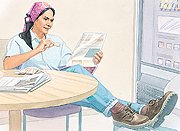Adapting to Pregnancy: First Trimester
As your body adjusts, you may have to change or limit your daily activities. You'll need more rest. You may also need to use the energy you have more wisely.
Your Changing Body
Almost every part of your body is affected as you adapt to pregnancy. The uterus and cervix will begin to soften right away. You may not look very pregnant during the first three months. But you are likely to have some common signs of early pregnancy:
|
|
-
Frequent urination
-
Mood swings
|
|
It's Not Too Late to Start Good Habits
What matters most is protecting your baby from this moment on. If you smoke, drink alcohol, or use drugs, now is the time to stop. If you need help, talk with your healthcare provider.
-
Smoking increases the risk of losing your baby or having a low-birth-weight baby. If you smoke, quit now.
-
Alcohol and drugs have been linked with miscarriage, birth defects, mental retardation, and low birth weight. Avoid alcohol and drugs.

Eat stomach-friendly foods like cottage cheese, crackers, or bread throughout the day.
Tips to Relieve Nausea
Although nausea can occur at any time of the day, it may be worse in the morning. To help prevent nausea:
-
Eat small, light meals at frequent intervals.
-
Get up slowly. Eat a few unsalted crackers before you get out of bed.
-
Drink water with lemon slices.
-
Eat a Popsicle in your favorite flavor.
-
Drink flat sodas.
-
Talk with your healthcare provider if you take vitamins that upset your stomach.

Take a break and put your feet up.
Work Concerns
The end of the first trimester is a good time to discuss working during pregnancy with your employer. Follow your healthcare provider's advice if your job requires you to stand for a long time, work with hazardous tools, or even sit at a desk all day. Your workspace, workload, or scheduled hours may need to be adjusted. Perhaps you can change body postures more often or take an extra break.
Advice for Travel
Talk to your healthcare provider first, but the second trimester may be the best time for any travel. You may be advised to avoid certain trips while you're pregnant. Food and water can be concerns in developing countries. Travel by car is a good choice, as you can stop, get out, and stretch. Bring snacks and water along. Fasten the lap belt below your belly, low over your hips. Also be sure to wear the shoulder harness.

Talk about your feelings with your partner.
Intimacy
Unless your healthcare provider tells you to, there is no reason to stop having sex while you're pregnant. You or your partner may notice changes in desire. Desire may be less in the first trimester, due to nausea and fatigue. In the second trimester, sex may be very enjoyable. The third trimester can be a challenge comfort-wise. Try different positions and see what's best for you both.

